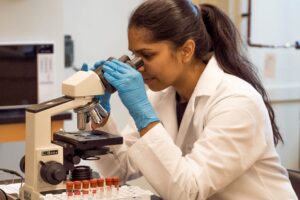Receiving a cancer diagnosis is a life-altering event that brings with it a whirlwind of emotions, challenges, and uncertainties. Among the many concerns faced by individuals confronting cancer is the potential impact of treatment on their fertility. The formidable battle against cancer often necessitates aggressive therapies, such as chemotherapy, radiation, or surgery, which can pose risks to reproductive health. However, thanks to advances in medical technology and the field of fertility preservation, individuals facing cancer can now embark on a journey towards preserving their fertility and nurturing hopes of building a family in the future.
For individuals who are diagnosed with cancer and wish to preserve their fertility before undergoing cancer treatments that may affect their reproductive capabilities, there are a few key points to consider:
- Impact of cancer treatments on fertility: Certain cancer treatments, such as chemotherapy, radiation therapy, and surgery, can have adverse effects on fertility. Chemotherapy drugs can potentially damage eggs or sperm, leading to temporary or permanent infertility. Radiation therapy directed towards the pelvic area can also harm reproductive organs. Surgical procedures involving the removal of reproductive organs or their part may also result in infertility.
- Fertility preservation options: Fertility preservation techniques aim to protect and preserve fertility before undergoing cancer treatments. The available options depend on factors such as the individual’s age, gender, type of cancer, and treatment plan. Some common fertility preservation methods include:
- Sperm banking: Men can preserve their fertility by freezing and storing sperm samples for future use.
- Egg freezing: Women can undergo an egg freezing procedure (also known as oocyte cryopreservation) where mature eggs are retrieved, frozen, and stored for later use.
- Embryo cryopreservation: For individuals/couples in a committed relationship, embryos can be created through in vitro fertilization (IVF) using sperm and eggs and then cryopreserved for future use.
- Ovarian tissue cryopreservation: In some cases, particularly for prepubertal girls, ovarian tissue can be surgically removed and frozen for later transplantation or extraction of eggs.
- Discussing fertility preservation with healthcare providers: It is crucial for individuals diagnosed with cancer to discuss fertility preservation options with their healthcare providers as early as possible. You may see a range of health professionals to discuss fertility which may include your reproductive endocrinologists, oncologists, gynecologists, or fertility specialists.
- Emotional and psychological considerations: Dealing with a cancer diagnosis can be emotionally challenging. Adding concerns about fertility and potential infertility can further impact a person’s well-being. It is essential to seek emotional support from healthcare professionals, counsellors, or support groups specializing in fertility and cancer-related issues.
- Post-treatment fertility options: Individuals can explore various paths to parenthood after completing cancer treatments. These may include assisted reproductive technologies (such as IVF or intracytoplasmic sperm injection), the use of frozen sperm, eggs, or embryos, adoption, surrogacy, or exploring alternative family-building options.
After completing treatment, here are a few points to consider when commencing/undertaking fertility planning:
- Checking fertility after treatment before trying to conceive: Before attempting to conceive, it is advisable to undergo fertility tests to assess the impact of your treatment on your fertility. Although there is no foolproof method to determine the exact effect of treatment on fertility, these tests can provide valuable insights to your fertility specialist or reproductive endocrinologist. You can discuss the cost of these tests with them to better understand the financial aspects involved.
- Natural conception: For females, if your ovaries are still releasing eggs and you have a uterus, there is a possibility of conceiving naturally after completing cancer treatment. Your medical team will assess your fertility through tests and if the results indicate a potential for pregnancy, they will encourage you to try conceiving naturally. However, even if your periods return following chemotherapy or pelvic radiation therapy, there is a significant risk of early menopause, which would permanently prevent natural conception. For males, if your semen production returns to normal and you are producing healthy, active sperm, there is a chance of naturally impregnating your partner after cancer treatment. It is important to consider the age of both partners as fertility declines with age. If the treatment has permanently affected your sperm production and ability to have erections, natural conception will no longer be possible. Your medical team will conduct fertility tests and evaluate your overall health. Depending on the type of treatment you received, they may recommend waiting 6 months to 2 years before attempting to conceive. It is advisable to discuss timing and contraception options with your specialist to make informed decisions.
- Assisted reproduction or artificial conception: This refers to the use of medical interventions or techniques to facilitate pregnancy when conception does not occur spontaneously or naturally. Some common forms of assisted reproduction include Intrauterine insemination (IUI) and In-vitro fertilisation (IVF).
- Using donor sperm, eggs and embryos: If you are infertile after cancer treatment, you could try for a pregnancy using sperm, eggs or embryos donated by another person. In most cases, these are donated by a family member or friend, however, in other cases, the eggs/sperm/embryos are donated by strangers, in which the donors have no legal or financial obligation to the child.
- Costs associated with Fertility treatment: The costs associated with fertility treatment in Australia can vary depending on several factors, including the type of treatment, the specific clinic or fertility specialist, and any additional services or procedures required. Additionally, Medicare can provide some level of financial assistance for fertility treatments, which can help reduce out-of-pocket expenses for eligible individuals. Private health insurance may also offer coverage or rebates for certain fertility treatments. To obtain accurate and up-to-date information on fertility treatment costs, it’s recommended to consult with fertility clinics or specialists directly, as they can provide specific details based on your individual circumstances.
Remember that fertility preservation options and success rates can vary depending on individual circumstances, so it is crucial to consult with healthcare professionals specialising in cancer treatment and fertility preservation to understand the most suitable options for your situation.
A cancer diagnosis can bring about significant concerns regarding fertility. However, with advancements in fertility preservation techniques, individuals facing cancer can now take proactive steps to protect their reproductive capabilities and future family-building possibilities. It is important to discuss fertility preservation options with healthcare providers early in the process, considering the potential impact of cancer treatments on fertility. Emotional support and guidance are also essential during this challenging time. By considering all the available options, individuals diagnosed with cancer can empower themselves to make informed decisions about preserving their fertility and fulfilling their dreams of having a family in the future.
For more information, please visit these trusted sites.
Please contact our Nurses on 07 5445 5794 or [email protected] if you have any questions.
The information in this document is based on resources from the Cancer Council Queensland, and the National Cancer Institute (America). All information provided by Bloomhill is based on research and best practice guidelines. Our model of care utilizes the Clinical Oncology Society of Australia (COSA) domains of wellness along with available clinical evidence. Always consult your care team regarding matters that affect your health. This is a guide intended for information only.





